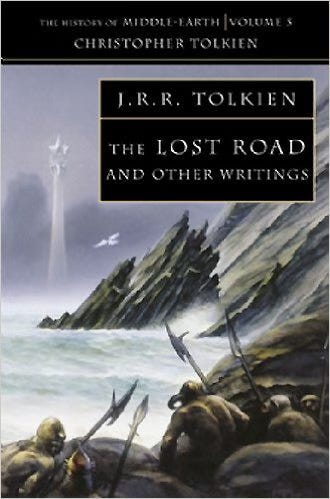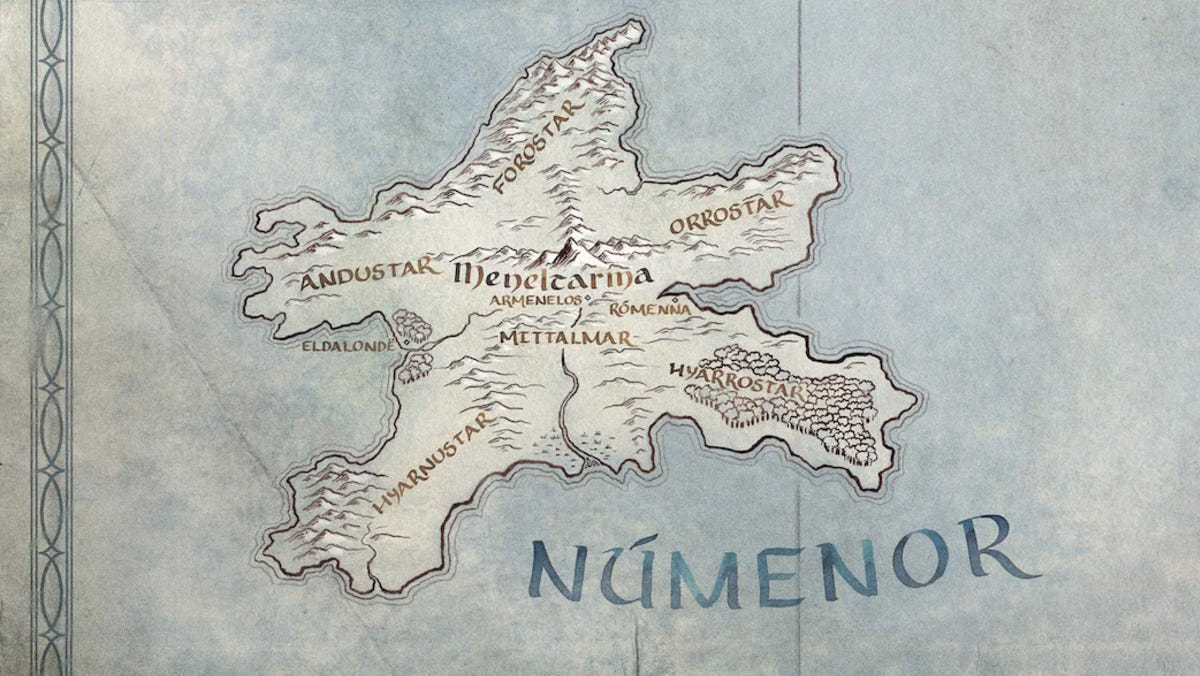Our exploration of Tolkien’s development of Elvish Pronouns continue! In this post we are going to look at some examples of Elvish pronouns that appear as dialogue and poetic verse in Tolkien’s sadly unfinished time travel story The Lost Road which was edited and published with commentary by Christopher Tolkien in The History of Middle-earth Volume Five The Lost Road and Other Writings.
To give a brief background The Lost Road is an unfinished time-travel story which Tolkien composed around 1935-36 at the same time that the Second Age story cycle of the great island of Númenor emerged in his world-building. It was one of the two stories that Tolkien and his Inklings friend and colleague C.S. Lewis decided to write to fulfill the need for more stories that they both enjoyed. Tolkien would later characterize these stories.
We originally meant each to write an excursionary Thriller': a Space-journey and a Time-journey (mine) each discovering Myth. But the Space-journey has been finished, and the Time-journey remains owing to my slowness and uncertainty only a fragment, as you know. (Letters, p. 29)
Academically I am currently living in The Lost Road (and Tolkien’s later The Notion Club Papers) for an exciting new Tolkien writing project and it was while working on some research that I came upon some Elvish dialogue that shows Tolkien’s use of Elvish pronouns in a period prior to the Quenya of The Lord of the Rings.
There are only four chapters in The Lost Road (with some notes by Tolkien what would have been). This unique ‘excursionary thriller’ starts in contemporary times with a father and son who learn that both their names and the dreams and visions they have connect them to a long tradition of father and sons and through these dreams they can travel back in time through the shared memories of these father and sons (if you have not read The Lost Road I highly recommend it and there is some really good scholarship about the it; especially by Verlyn Flieger and John D. Rateliff)
As Tolkien said in his notes ‘in my tale we were to come at last to Amandil and Elendil leaders of the loyal party in Númenor, when it fell under the domination of Sauron.’ (Lost Road, p. 57)
In the completed chapter three and incomplete chapter four the father/son pair is Elendil and (not Amandil as Tolkien indicated in the note) but Herendil. At the start of Chapter 3 Elendil is looking for his son and he cries out looking for him. Herendil who has having a relaxing time laying on the stone above him responds in Elvish
Man-ie, atto, man-ie - What is it father, What is it?
Here we can see the use of man (what) with the suffixed (ie) for (is it)
Later in the chapter Herendil tells his father he loves him
Atarinya tye-melane - My father I love thee
The possessive pronoun (inya) is appended as a suffix to the noun (atar) and the direct object you is prefixed to the verb for love mel- with the verb ending.
And Elendil responds
A yonya inyë tye-mela
And I too, my son love thee
In this case the emphatic pronoun inyë is used by Elendil to emphasize the I while again the you pronoun is affixed to the prefixed with a hyphen to the verb mel- to love.
In addition to the snatches of Elvish dialogue (oh would there were more!) in chapter three Tolkien introduces two lines of Elvish which ‘came to him [Elendil], far off and strange, as some melody in archaic speech sung sadly in a forgotten twilight in the beginning of a man’s journey in the world
Ilu Ilúvatar en káre eldain a firimoin
ar antaróta mannar Valion: numessier……
The father made the world for elves and mortals
and he gave into the hands of the Lords. They are in the West (Lost Road, p. 63)
In the notes to this chapter Christopher notes that in one of the versions of this chapter the complete song that Elendil hears which is called Fírel’s Song is given complete with a translation. You can view the full poem here - https://tolkiengateway.net/wiki/Fíriel%27s_song
In terms of pronouns there is one line where an original pronoun appears
Toi aina, mána, meldielto - enga morion:
They are holy, blessed, and beloved: save the dark one.
In terms of pronouns - Toi ‘they’ is a stand alone emphatic pronoun and this form only appears in this poem. Tolkien would later change this form to ‘te’ in The Lord of the Rings poems.
So we are continuing to see the flexible nature of Tolkien’s Pronoun system which will move to more standardization in the Elvish of The Lord of the Rings.
In the next post we are going to take a deep dive the very interesting Elvish fragment from this same period called The Elves at Koivienéni which has received some focus by Elvish language scholars and shows an interesting use of a pronoun that moves the form closer to the usage Tolkien will use in The Lord of the Rings poems.
Namárië for now!



